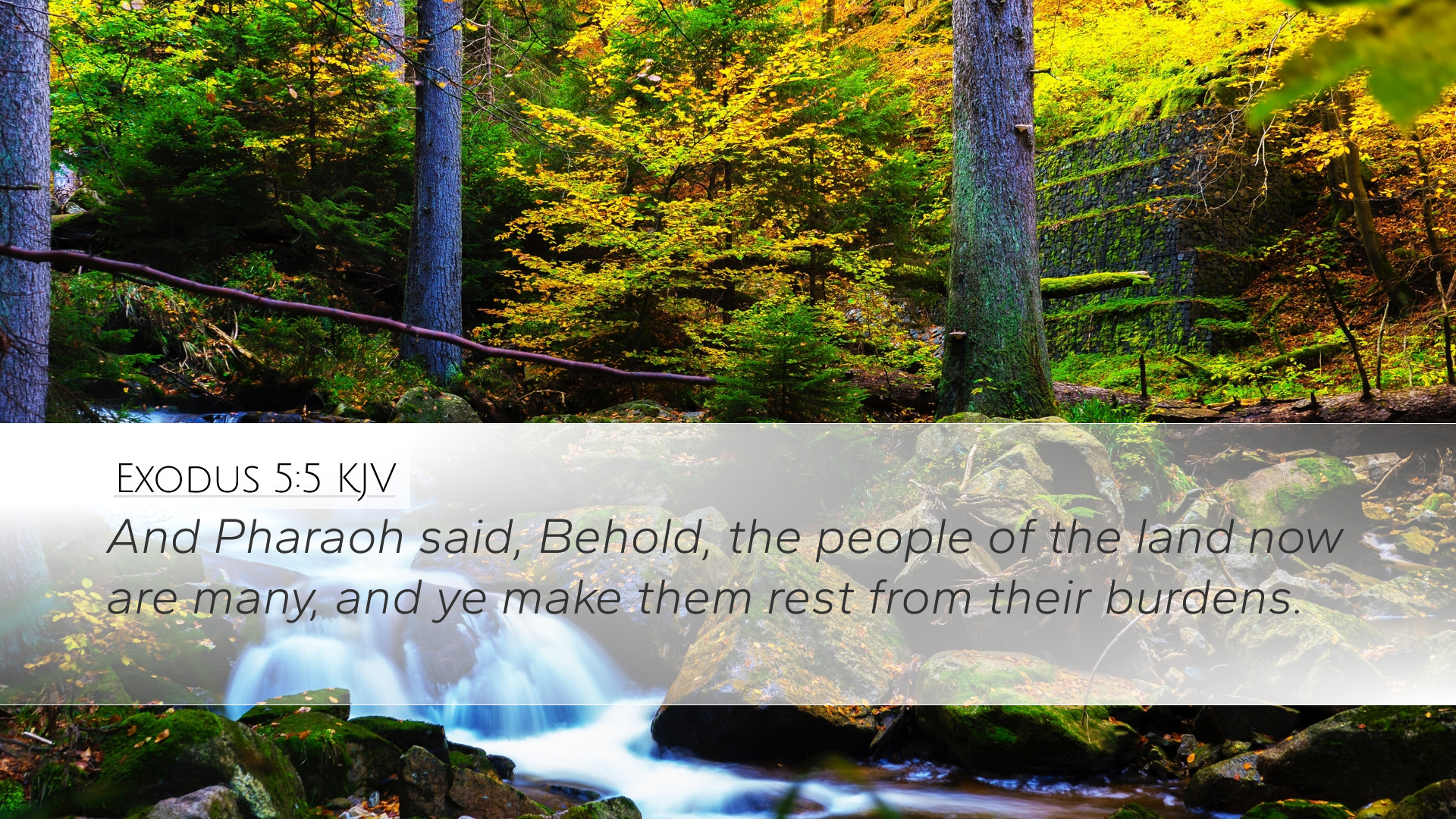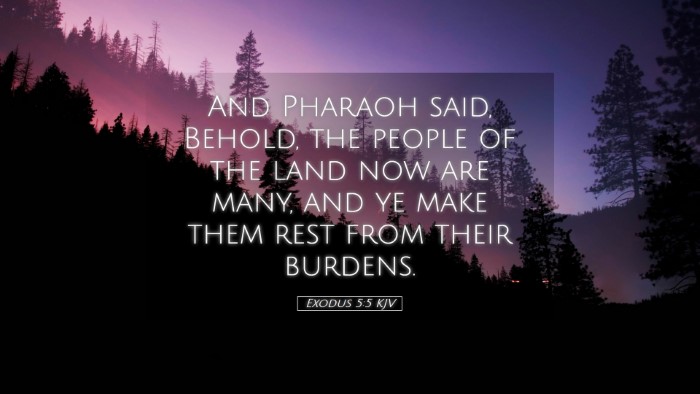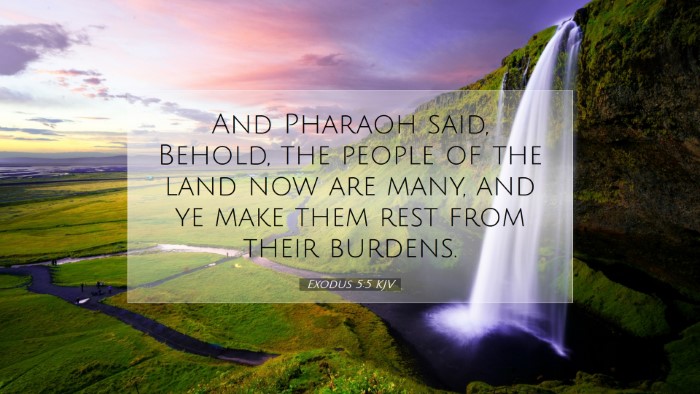Commentary on Exodus 5:5
Verse: "And they said, The God of the Hebrews hath met with us: let us go, we pray thee, three days' journey into the desert, and sacrifice unto the LORD our God; lest he fall upon us with pestilence, or with the sword." (Exodus 5:3)
Introduction
This verse marks a pivotal moment in the narrative of Exodus, establishing the ongoing struggle between the God of Israel and the Egyptian authority. The request made by Moses and Aaron highlights the urgency of divine worship amid oppression. Significant theological implications emerge from this request, notably the necessity of freedom for worship and the impending judgment that accompanies disobedience.
Contextual Background
The context of Exodus 5:5 presents the Israelites in desperate circumstances, subjected to intense slavery under Pharaoh. This chapter serves as a turning point; the invitation for the Israelites to worship indicates God's intent to deliver His people from bondage. Understanding the historical backdrop is crucial for appreciating the depth of this passage as it reflects both divine sovereignty and human agency.
Insights from Matthew Henry
Matthew Henry underscores the significance of the request made by Moses and Aaron. He emphasizes that the appeal to go and sacrifice signifies not merely a religious obligation but also the earnest desire for deliverance. Henry elucidates that the phrase "three days' journey" is symbolic, representing a transition from bondage to freedom. It also reflects the seriousness of worship; neglecting such reverence could lead to divine judgment, as indicated in their warning of pestilence or the sword.
- Divine Encounter: Henry notes that the phrase "met with us" suggests a profound divine encounter that invigorated the hearts of Moses and Aaron. They stand as mediators in front of Pharaoh, demonstrating their faith in God's power.
- Pestilence and Judgment: The mention of pestilence depicts the severity with which the Israelites view the threat of disobedience to God. The forewarning serves as a narrative device, foreshadowing the plagues that would befall Egypt.
Insights from Albert Barnes
Albert Barnes provides a detailed analysis of the phrase "the God of the Hebrews." He points out that this title emphasizes the covenant relationship between God and His people, signifying ownership and care. Barnes argues that this acknowledgment is crucial for Pharaoh, who represented the world powers that challenge divine authority.
- Significance of “Three Days’ Journey”: Barnes interprets this three-day journey not just in a literal sense but rather as a need for a 'sabbatical' from slavery to worship. It also serves as a clear demarcation between Egypt's idolatry and Israel's devotion to the One True God.
- Urgency of Worship: Barnes emphasizes the urgency of their plea, suggesting that the fate of the Egyptians hinges on the Israelites’ ability to worship God freely. Pharaoh’s refusal would ultimately lead to calamity for Egypt, as shown through the subsequent plagues.
Insights from Adam Clarke
Adam Clarke expresses a deep theological reflection on the necessity of divine worship as portrayed in this verse. He emphasizes that the people’s request to sacrifice is rooted in their longing for restoration and reconciliation with God. Clarke notes that the urgency expressed in the request underscores the burdens of oppression and the despair of the Israelites.
- Theological Implications: Clarke delves into the implications of this verse for understanding worship as an essential element of faith. The Israelites’ approach to Pharaoh denotes an appeal not solely for physical freedom but for spiritual liberation through worship.
- Prophetic Foreshadowing: He also notes how this moment of pleading foreshadows the events leading to the ultimate deliverance of the Israelites, culminating in the Passover and the Exodus. It highlights God’s intention to lead His people out of bondage into true worship.
Thematic Reflections
The themes present in Exodus 5:5 resonate with contemporary believers, particularly concerning the quest for spiritual freedom amidst various forms of bondage. The urgent call for worship serves as a reminder of the intrinsic need for a relationship with God, which transcends the trials of life.
- Freedom of Worship: The desire to journey into the desert signifies a need for separation from worldly influences, illustrating the importance of setting aside time specifically for a relationship with God.
- Divine Judgment: The reference to pestilence and sword reflects the serious consequences of disregarding God. It invites believers to consider the weight of disobedience and the necessity of heeding God’s commands for spiritual vitality.
Conclusion
Exodus 5:5 is a rich theological passage that encapsulates elements of desperation, divine authority, and the foundational necessity of worship. The insights gleaned from public domain commentaries enhance our understanding of the exigent nature of the Israelites' plea and the severe implications of Pharaoh's response. For pastors, students, and theologians, this verse serves as a profound reminder of the significance of worship in the life of a believer and the critical relationship between divine deliverance and human dedication.


